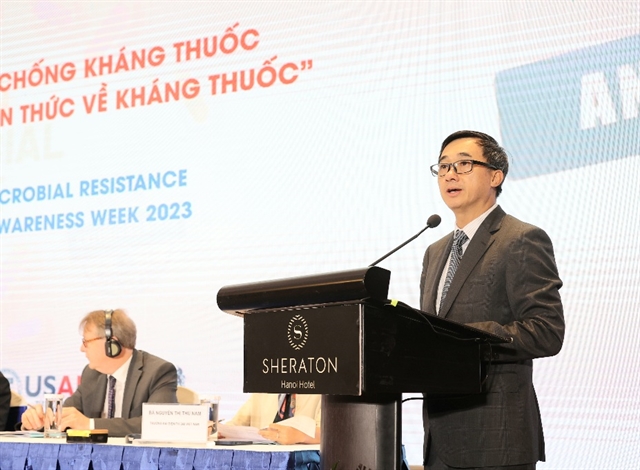 Society
Society

 |
| Deputy health minister Trần Văn Thuấn speaks at the event. Photo suckhoedoisong.vn |
HÀ NỘI Việt Nam is one of the first six countries in Asia-Pacific to have developed and implemented a national action plan on antimicrobial resistance prevention and control, deputy health minister Trần Văn Thuấn said during an event in Hà Nội on Monday.
Speaking at the conference disseminating the national strategy on antimicrobial resistance and responding to the World Antimicrobial Awareness Week, he said Việt Nam has been highly appreciated by the international community for its efforts in drug resistance prevention and control.
The World Antimicrobial Awareness Week this year lasted from November 18 to 24, with a focus on the theme of "Preventing antimicrobial resistance together".
Thuấn said despite scientific advances made over the past ten years, antimicrobial resistance is still a concern in Việt Nam.
The national action plan on antimicrobial resistance prevention and control for the 2013-20 period with the participation of the ministries of Health, Agriculture and Rural Development, Industry and Trade, and Natural Resources and Environment and other development stakeholders around the world have partly promoted the efforts, he said.
However, there remain many challenges in Việt Nam, including the limited capacity of laboratories to conduct monitoring and data analysis, inappropriate antibiotic prescription; lack of enforcement of regulations on antibiotic sales, the deputy minister said.
He said the Prime Minister recently issued the National Strategy on Antimicrobial Resistance Prevention and Control for the 2023-30 period, with a vision towards 2045. The strategy has set the general goal of slowing the progression of drug resistance while preventing and controlling the spread of drug-resistant microorganisms and infectious diseases.
At the same time, it ensures continuous availability of antimicrobials and appropriate use of antimicrobials to effectively treat infectious diseases in humans and animals, helping protect, care for and improve human and animal health while protecting the environment and developing the national economy and society, he said.
"Achieving the stated goal requires the efforts and commitment of all ministries and sectors from central to local levels,” he told the conference.
Associate Professor Lương Ngọc Khuê, general director of the Administration of Medical Service under the Ministry of Health, said the strategy will provide solutions to strengthen supervision and promote responsible use of antibiotics with four specific goals.
First of all, raising awareness of local authorities at all levels and understanding of medical staff, veterinarians and people about drug resistance prevention and control.
Secondly, strengthening the drug resistance monitoring system to promptly warn about the emergence, spread, level and trend of drug resistance of microorganisms.
The other two goals are to reduce the spread of microorganisms and infectious diseases and to use antimicrobial drugs in humans and animals appropriately, safely and responsibly, he said.
Dr Angela Pratt, representative of the World Health Organization (WHO) in Việt Nam, highly appreciated the Vietnamese Government's approach and response to World Antimicrobial Awareness Week.
She said Việt Nam’s strategy is an important step towards slowing the progression of drug resistance, which WHO has declared one of the top 10 public health threats facing humanity.
WHO and other partners are ready to support the Government and people of Việt Nam in the fight against antimicrobial resistance, she said. VNS




